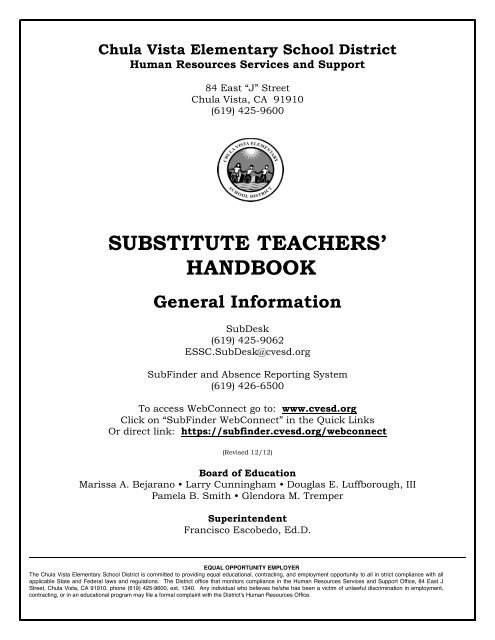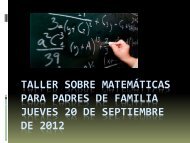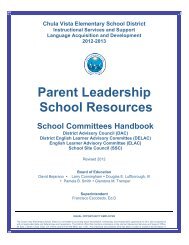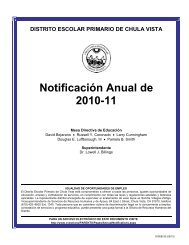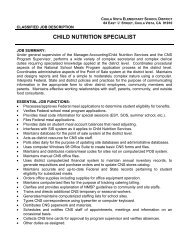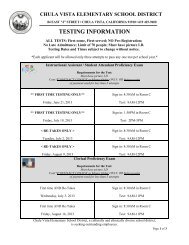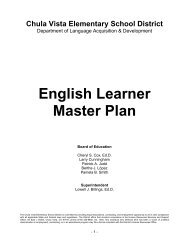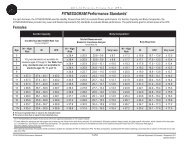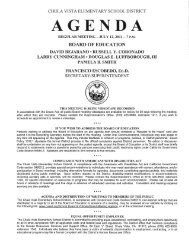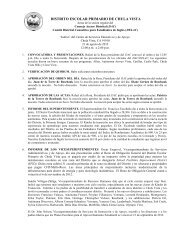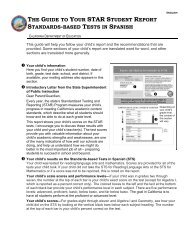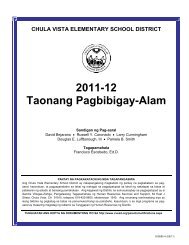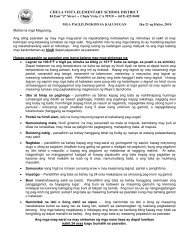Certificated Handbook - Chula Vista Elementary School District
Certificated Handbook - Chula Vista Elementary School District
Certificated Handbook - Chula Vista Elementary School District
You also want an ePaper? Increase the reach of your titles
YUMPU automatically turns print PDFs into web optimized ePapers that Google loves.
<strong>Chula</strong> <strong>Vista</strong> <strong>Elementary</strong> <strong>School</strong> <strong>District</strong><br />
Human Resources Services and Support<br />
84 East “J” Street<br />
<strong>Chula</strong> <strong>Vista</strong>, CA 91910<br />
(619) 425-9600<br />
SUBSTITUTE TEACHERS’<br />
HANDBOOK<br />
General Information<br />
SubDesk<br />
(619) 425-9062<br />
ESSC.SubDesk@cvesd.org<br />
SubFinder and Absence Reporting System<br />
(619) 426-6500<br />
To access WebConnect go to: www.cvesd.org<br />
Click on “SubFinder WebConnect” in the Quick Links<br />
Or direct link: https://subfinder.cvesd.org/webconnect<br />
(Revised 12/12)<br />
Board of Education<br />
Marissa A. Bejarano • Larry Cunningham • Douglas E. Luffborough, III<br />
Pamela B. Smith • Glendora M. Tremper<br />
Superintendent<br />
Francisco Escobedo, Ed.D.<br />
EQUAL OPPORTUNITY EMPLOYER<br />
The <strong>Chula</strong> <strong>Vista</strong> <strong>Elementary</strong> <strong>School</strong> <strong>District</strong> is committed to providing equal educational, contracting, and employment opportunity to all in strict compliance with all<br />
applicable State and Federal laws and regulations. The <strong>District</strong> office that monitors compliance in the Human Resources Services and Support Office, 84 East J<br />
Street, <strong>Chula</strong> <strong>Vista</strong>, CA 91910, phone (619) 425-9600, ext. 1340. Any individual who believes he/she has been a victim of unlawful discrimination in employment,<br />
contracting, or in an educational program may file a formal complaint with the <strong>District</strong>'s Human Resources Office.
DISTRICT ADMINISTRATION<br />
Francisco Escobedo, Ed.D.<br />
Superintendent<br />
Sandra Villegas-Zúñiga<br />
Assistant Superintendent<br />
Human Resources Services & Support<br />
Oscar Esquivel<br />
Assistant Superintendent<br />
Business Services & Support<br />
John M. Nelson III, Ed.D.<br />
Assistant Superintendent<br />
Instructional Services & Support<br />
Page 1
OUR SHARED VALUES<br />
EQUALITY<br />
EQUITY<br />
We believe each child is an individual of great worth entitled to develop to his or her full potential. All<br />
children can and will learn and deserve equal access to a quality education.<br />
We believe there is no significant difference in educational outcomes based on race, gender, or<br />
economic status. Solutions, resources, programs, services, and support are applied in a manner<br />
which develops the full potential of each child.<br />
ACCOUNTABILITY<br />
We value and recognize individuals who assume responsibility for and demonstrate commitment and<br />
dedication to serving the interests of all children.<br />
ETHICAL RESPONSIBILITY<br />
DIVERSITY<br />
TEAMWORK<br />
INNOVATION<br />
We value each individual who practices, teaches, and serves as a role model of dignity, respect,<br />
honesty, integrity, and trust.<br />
We seek, encourage, and respect each individual’s contributions and value a multicultural perspective.<br />
We believe that families are the primary role models for our children. We are committed to teamwork<br />
and collaborations to provide maximum services for students, staff, and community. This partnership<br />
among families, community, and schools is the foundation of our children’s educational success.<br />
We are committed to challenging the status quo and embracing a technological world.<br />
EXCELLENCE<br />
We are committed to high standards of performance throughout the <strong>District</strong> and continuously seek and<br />
utilize new knowledge and skills.<br />
Page 2
OUR SHARED VISION<br />
The <strong>Chula</strong> <strong>Vista</strong> <strong>Elementary</strong> <strong>School</strong> <strong>District</strong> is committed to providing a successful, safe, challenging, and<br />
nurturing educational experience, while promoting the job and importance of learning for all children.<br />
Our children are high-achieving innovative thinkers. They are multi-literate, self-reliant, and confident. They<br />
have a lifelong love of learning and are socially responsible citizens. The <strong>District</strong> takes pride in developing<br />
each child’s full potential, while recognizing his or her uniqueness.<br />
We value and find strength in our diversity. Learning is meaningful and relevant, connected with each child’s<br />
individual needs, ethics, culture, and experiences and is linked with the world outside the classroom.<br />
Families, staff, and our entire community are full partners actively working in a collaborative manner for the<br />
benefit of each child’s education. Together we have an investment in our <strong>District</strong>’s Vision and believe a child’s<br />
success equals our success. We ensure an environment in which everyone is valued and treated with dignity<br />
and respect. Everyone assumes responsibility for the success of the school community.<br />
The entire educational community accepts the challenge of change and is motivated to acquire skills and<br />
values for a rapidly changing world. We create dynamic learning experiences by supporting and encouraging<br />
excellent teaching and the educational growth of family and staff.<br />
The <strong>Chula</strong> <strong>Vista</strong> <strong>Elementary</strong> <strong>School</strong> <strong>District</strong> community is dedicated to instilling hope for the future so that<br />
today’s children will share their vision with future generations.<br />
Page 3
INTRODUCTION<br />
Welcome<br />
The <strong>Chula</strong> <strong>Vista</strong> <strong>Elementary</strong> <strong>School</strong> <strong>District</strong> would like to take this opportunity to welcome you to our district.<br />
We are pleased that you have accepted a substitute teaching position with our district and we would like to<br />
assist you in making it a pleasant and rewarding educational experience for you and the children with whom<br />
you will be working.<br />
You are a vital part of our school system. It would be difficult for us to operate our schools on a satisfactory<br />
basis without personnel such as yourself providing continuity of instruction during absences of our regular<br />
certificated staff. We feel confident that you will do everything possible to meet the high standards of today’s<br />
education.<br />
Your service with our district is greatly appreciated and while you are serving as a staff member, we hope that<br />
you will enjoy our hospitality and make appropriate use of the facilities we have for serving the staff and<br />
children of our district.<br />
The <strong>School</strong> Secretary, Principal and staff members all stand ready to aid you in meeting your professional<br />
responsibilities.<br />
Again, welcome to the <strong>Chula</strong> <strong>Vista</strong> <strong>Elementary</strong> <strong>School</strong> <strong>District</strong>. We are glad you are here.<br />
Page 4
Assignments: The SubFinder System will contact substitute teachers for assignments on an as-needed basis<br />
with normal contacts being made during the following times:<br />
1. 5:00 a.m. – 8:00 a.m. or until assignments are filled<br />
2. 5:00 p.m. – 9:30 p.m. (Monday – Friday)<br />
3. 5:00 p.m. – 9:30 p.m. (Weekends & Holidays)<br />
You may only accept assignments in one of the following ways in order to be paid as a substitute:<br />
1. SubFinder System calls you or you call the SubFinder System<br />
2. SubDesk Staff<br />
3. <strong>School</strong> office staff or employees may pre-arrange you to sub at their school site IF they enter<br />
the absence in the SubFinder System and give you the job number<br />
4. Accept jobs online through WebConnect<br />
If any employee asks you to work for them, remind them to call the SubFinder System and request or<br />
pre-arrange you by your substitute request ID number. You will be paid for what’s in SubFinder, not<br />
for what someone tells you.<br />
We try to place our substitutes in positions where the substitute has expressed a preference for a particular<br />
assignment; however, this is not always possible. We hope that you will help us to meet the educational needs<br />
of our children when we are unable to meet your request.<br />
Log: Keep a log of the dates you work, where you work, the time you work, the job number and the name of<br />
the person you are replacing. Your time sheets will be sent AUTOMATICALLY to Payroll, but if you find an<br />
error do not hesitate to call the SubDesk so we can resolve the error.<br />
To cancel an assignment: If for any reason you have accepted an assignment and find that you are unable<br />
to report for work, please contact the SubFinder System immediately and cancel yourself out of the assignment<br />
and make yourself unavailable for work. If you have accepted an assignment and are not able to complete the<br />
assignment, please contact the SubDesk as early as possible and let them know that you are not able to<br />
complete your assignment.<br />
To Report an absence: If you are in a long-term assignment you may report your absence for a day or two.<br />
Call the SubFinder and Absence Reporting System and Press # 4 from the main menu to report an absence.<br />
SubFinder will ask you for information as to when you will be absent. Do not hang up until you get your new<br />
job number or the absence will not be reported properly.<br />
Unavailable & Do Not Disturb Range: If you know in advance that you will not be available for any<br />
assignment for any duration of time, please notify the SubFinder System and put in an unavailable date range.<br />
If you are unavailable for work longer than 30 days, please notify the SubDesk.<br />
Check in at the office: All substitutes MUST sign-in with the secretary in the school office every day prior to<br />
the assignment. All substitutes need to sign out when you leave campus at the end of the day. The school will<br />
inform you about room assignments, keys, yard duty schedule and other information pertaining to the regular<br />
teacher’s duties.<br />
Workday: A full workday under usual circumstances shall be the same as for the regular staff member. The<br />
substitute shall report for work the times the SubFinder System tells you to. You need to report on time and<br />
CANNOT LEAVE EARLY. If you receive a late call or an emergency arises, let the SubDesk know so the<br />
school can be informed. Always call the SubDesk, not the school. If you arrive more than 10 minutes late and<br />
another sub has been secured you will need to leave and not be paid for your time UNLESS you have notified<br />
the SubDesk.<br />
Page 5
All materials including room key, must be returned to the school office before you leave at the end of the<br />
school day. Do not forget to sign out when you leave.<br />
Assignments in error: We hope we do not assign you where there is not a vacancy, but if it happens and we<br />
are unable to reassign you to another school site, you will receive one half day pay to compensate you for your<br />
travel time and you may leave the school site and go home. Be sure the SubDesk knows the situation before<br />
you leave the school site.<br />
Evaluations/Warnings: The site administrator may evaluate your services and the evaluation or warning will<br />
be forwarded to Human Resources for placement in your personnel file (samples provided on pages 16-19).<br />
These evaluations or warnings will be of assistance for district employment purposes if you seek contracted<br />
employment in our district.<br />
A site administrator may submit an evaluation of your services as a substitute at any time or a warning for poor<br />
performance, no-show or tardy. However, after you have served in the same assignment for a minimum of<br />
three days, you may request that an evaluation of your services to the Human Resources Department.<br />
You may be assured that a negative evaluation/warning will not become a part of your personnel file without<br />
your knowledge and opportunity to respond to the evaluation/warning. Do not hesitate to remind the<br />
administrator if you serve three or more days in the same assignment and have not received and evaluation.<br />
You will receive a copy of all evaluations/warnings from the Sub Desk if you do not receive a copy from the<br />
school site.<br />
Work Injury: Most California workers are protected in the event of job-related injuries and illness by workers’<br />
compensation, which is paid for by the <strong>District</strong>. If you are injured or become ill as a result of your job, this<br />
coverage pays for medical care, necessary rehabilitation services, income in case you are disabled and can’t<br />
work, or death benefits to your dependents.<br />
If you would prefer to be treated by your doctor in the event of any job-related injury, notify the district in<br />
WRITING by providing the name of your personal physician or chiropractor who has treated you in the past<br />
and who keeps your medical records. After 30 days have passed following the date of your injury or date you<br />
reported your injury, you may see a doctor of your choice but must give the district’s workers’ compensation<br />
administrator the doctor’s name and address. Should you desire to be treated by your personal physician<br />
please request an “Employee Notification of Personal Physician” or an “Employee Notification of Personal<br />
Chiropractor” form from the Human Resources Department prior to sustaining an injury.<br />
Always IMMEDIATELY notify your supervisor of any work-related injury or illness. The Risk Manager will notify<br />
the claims administrator. You may be eligible for workers’ compensation benefits, but first the work-related<br />
injury or illness must be reported. Only then can the system begin to work for you.<br />
In addition, be sure to notify the SubDesk of your injury.<br />
Maternity: Substitute teachers are covered by the same rules that apply to regular employees regarding<br />
maternity. Expectant mothers may continue to substitute prior to delivery as long as able with their doctor’s<br />
permission. Return to service may be as soon after delivery as your doctor approves.<br />
Food Service: There are cafeterias at all school sites where your lunch may be purchased. Please feel free<br />
to join the other staff members at lunchtime. All school sites have refrigerators and microwaves. If you choose<br />
to bring your lunch, feel free to store or prepare your lunch.<br />
Credential: It is your responsibility to have a valid California teaching credential or permit authorizing the type<br />
of service you are performing. The <strong>District</strong> is not authorized to employ anyone in a position requiring<br />
certification unless the employee holds a valid California Credential or permit.<br />
Page 6
Your credential must be registered with the San Diego County Office of Education and a copy forwarded to the<br />
SubDesk in order to ensure compensation for services rendered.<br />
Tuberculosis Test: Verification of a skin test against tuberculosis taken within the last four years is required<br />
prior to employment and must be filed in your personnel file at the <strong>District</strong> office. Those who have a history of<br />
a positive skin test must present a certificate from a health provider stating that they are free of communicable<br />
diseases.<br />
Retired Teachers: State law provides that retired teachers may serve as substitutes and earn a limited salary<br />
July 1 st – June 30 th . It is the responsibility of the individual retired teacher serving as a substitute not to exceed<br />
the limited amount. No retirement deductions are made from the amount earned.<br />
Retired teachers applying for substitute work must pass a physical examination as prescribed by the State<br />
Department of Education. This health clearance must be secured upon employment before working.<br />
Ethics: As a substitute teacher you are expected to maintain the same ethical standards as a contracted<br />
teacher.<br />
Change in name, address, phone or marital status: Please notify the SubDesk immediately of any change<br />
in your name, address, phone number, or marital status.<br />
If your phone number is just a temporary change you may do this yourself in the SubFinder System.<br />
Cell Phones: If your number in SubFinder is a cell phone number, be sure your cell phone is on during the<br />
call out times EVEN if you already have an assignment. There may be changes in the assignment or there<br />
may be a cancellation.<br />
Applying for Positions: All positions must be applied for online at www.cvesd.org. Substitutes must be on<br />
the employable list to apply for positions.<br />
Medicare Coverage: President Reagan signed into law PL272 mandating Medicare coverage for all new<br />
employees hired on or after April 1, 1986. This includes employees who are not now covered by Social<br />
Security. If there are any questions, please call the Payroll Department at (619) 425-9600 ext 1395.<br />
Exposure to Childhood Diseases: Working with school age children may expose staff to various childhood<br />
diseases. Some of these diseases may cause birth defects and/or fetal death if contracted by the mother<br />
during pregnancy. If you are considering becoming pregnant, you may want to discuss your susceptibility to<br />
these diseases with your doctor.<br />
The diseases that may be reason for concern as listed by the California Teratogen Information Service are:<br />
1. Cytomegalovirus (CMV)<br />
2. Rubella<br />
3. Varicella (Chicken Pox)<br />
4. Rubella (Measles)<br />
5. Roseola<br />
6. Fifth Disease<br />
7. Mumps<br />
In any case if you arrive at a school site and are told of a disease at that site, you may leave if it is a possible<br />
concern for you. Be sure to call the SubDesk before you leave the school site.<br />
For information concerning these diseases, call the California Teratogen Information Service at U.C.S.D. at<br />
760-294-6084. If you have any questions please contact the Human Resources Department.<br />
Page 7
Working Conditions at the <strong>School</strong> Site: Substitutes are responsible for maintaining attendance records for<br />
their class in accordance with the directions given by the school principal. The record of pupil attendance is<br />
very important and must be absolutely accurate.<br />
Teachers take playground duty as scheduled by the principal. Each school has its own regulations regarding<br />
play areas, so you should check in the teacher’s plan book or with the principal.<br />
In the supervision of children, you should report any situation that may be dangerous or detrimental to the<br />
health and welfare of the children (strangers on the playground, defective equipment, student behavior,<br />
weapons, animals, drugs, etc). Your report should be made immediately to the principal. Your constant<br />
moving presence among the children in the classroom or on the playground will help to insure proper behavior.<br />
Avoid standing or sitting in one place. Your supervisory responsibilities continue until you are relieved or at the<br />
school days end.<br />
Fire drills are conducted at each school and your principal should apprise you of such drills he/she conducts.<br />
Should you experience a fire drill, the aide or a responsible student may lead the class to a safe location via<br />
the customary exit route or an alternate one if usual exit route is blocked. You must make certain that all pupils<br />
have left the room before you. You must then close the classroom door behind you as you leave. As a safety<br />
precaution pupils must maintain complete silence during the drill and you must take roll when safety is<br />
reached; should a pupil be missing after roll call has been taken, notify the principal immediately.<br />
Earthquake and other disaster drills are likely to be conducted while you are substituting, however, in the event<br />
that such an incident should occur, give the command, “DUCK AND COVER”, as pupils have been trained to<br />
take appropriate action on command. It is imperative that you become acquainted with all safety procedures at<br />
your assigned site.<br />
Please try to remain aware of physical conditions in the classroom (heat, light, air). In addition, we like to<br />
maintain clean, attractive and well-kept classrooms at all times.<br />
Retirement Systems: Federal legislation mandated Social Security coverage for all employees on January 1,<br />
1992 unless they are covered by another retirement system, such as STRS or PARS.<br />
On December 17, 1991 the Board of Education approved the Public Agency Retirement System (PARS) for<br />
eligible employees.<br />
You have a choice. You may either join State Teachers Retirement System (STRS) or PARS. STRS will<br />
deduct 8% from your check and PARS will deduct 3.75% from your check.<br />
Following is a brief description of the two retirement plans. If you do not make a choice you will automatically<br />
be placed in PARS.<br />
STATE TEACHERS RETIREMENT SYSTEM (STRS)<br />
Teachers and other certificated employees of California Public <strong>School</strong>s, kindergarten through community<br />
college, are eligible to be members of STRS. Once you become a member, your membership will stay in<br />
effect unless you terminate employment and receive a refund of the contributions in your account. If you are<br />
no longer teaching but leave your contributions on deposit with STRS, you become an inactive member.<br />
While a member of STRS you contribute 8% of your gross pay to the retirement fund. Your employer and the<br />
State of California also contribute to the fund. The money in the fund is then invested to make your future<br />
retirement income possible.<br />
STRS operates as a “defined benefit plan”. This means that your retirement benefits are guaranteed by law.<br />
The benefit formula is based on age, years of service and on average final salary.<br />
Page 8
You are required to become a member of STRS on the first day of the pay period following the month you<br />
render your 101 st day of service within one school year in the State of California. This membership is<br />
mandatory under state law and cannot be waived by you or the school district.<br />
PUBLIC AGENCY RETIREMENT SYSTEM (PARS)<br />
A federal law, the Omnibus Budget Reconciliation Act of 1990 (OBRA 90) mandates that public sector<br />
employees who are not members of their employer's existing retirement system as of January 1, 1992 be<br />
covered by Social Security or an alternative plan.<br />
If you enroll in an alternative plan called the Public Agency Retirement System (PARS), PARS satisfies federal<br />
requirements and provides employees with substantial cost savings compared to Social Security. Social<br />
Security requires that the equivalent of 12.4% of your salary be contributed each month, however, PARS<br />
requires only a 7.5% contribution to your retirement account. Your contribution is 3.75% and your employer’s<br />
contribution is 3.75%.<br />
This is only a general description of what you can expect as a participant in PARS. The plan document<br />
contains a more detailed description and your employer has a copy, which you may read. If this description<br />
says something different from the plan document, the plan document will be followed, not this description.<br />
Mailbox: Each teacher in every school has a box in the office. In most schools you will find attendance<br />
information, dated material and other pertinent information. Please take only those items when substituting<br />
one or two days. The regular teacher will pick up the remaining items upon returning to school.<br />
Assertive Discipline: The maintenance of good order and a desirable learning environment in the classroom<br />
is one of the most important responsibilities of the substitute. A positive attitude, sense of humor, courtesy and<br />
respect for others will do much to increase the effectiveness and status of the substitute teacher. If a student<br />
should become too difficult a problem, the substitute should be familiar with the discipline plan for that<br />
classroom. The school site administrator is also available for help.<br />
Classroom Routines: Substitutes should be sure to understand the attendance and accounting procedures<br />
used in the school where they are assigned. Rooms should be maintained and left in good order. Keys are<br />
issued to substitutes in the morning, and doors should be locked whenever the room is left unattended.<br />
Substitutes must walk with students to and from the playground. Keys should not be given to a student, and<br />
students should not be left alone in the classroom. Students are not permitted to leave campus without<br />
administrative approval.<br />
Supervision Duties: Particular attention should be directed to the supervision duties for which the regular<br />
teacher is responsible. If the instructions are not clear as to supervision responsibility, check with the school<br />
office to clarify. It is important to be on time to all duties assigned to you.<br />
<strong>School</strong> Records: <strong>School</strong> records are confidential and should be treated in a professional manner. Individual<br />
students, teacher or school situations should not be discussed at other schools or with people other than the<br />
administrator or teacher in that particular school.<br />
Student Illness or Accident: Substitutes should always be aware of and concerned with the safety and<br />
welfare of their students. Become familiar with the school’s emergency procedures and the location of the<br />
nurse’s office in case of student illness or injury. If a student is too ill to go alone, send someone with him/her,<br />
or call the office and ask for help. A substitute must promptly report any accident, which is called to their<br />
attention, giving exact details and names of witnesses. The official form for such reports is available in the<br />
school office and must be completed the day the accident occurs. <strong>School</strong> clerical staff assistance is available.<br />
Page 9
Discipline: You are encouraged to take a positive approach to the problem of discipline. In this way both the<br />
teacher and student understand expectations and consequences. The goal we have for children is selfdiscipline<br />
and positive behavior. If pupils are working on worthwhile projects and you are pleasant and firm,<br />
discipline problems will not usually develop.<br />
You will find it useful to follow the example of successful teachers in matters of student discipline. The<br />
following are some of the procedures that they use:<br />
1. Be fair, firm and consistent.<br />
2. Do not “group punish”.<br />
3. Call attention to good behavior rather than misbehavior.<br />
4. Praise in public; reprimand in private.<br />
5. Sarcasm or other embarrassing methods have no place in the teacher’s relationship with pupils.<br />
6. Set up reasonable standards and stick to them.<br />
7. Have a sense or humor.<br />
Instructional Information: One of the most practical ways for you to learn more about your job is to observe<br />
a regular teacher. This would be especially helpful if you have not had experience with the instructional<br />
program of the <strong>Chula</strong> <strong>Vista</strong> <strong>Elementary</strong> <strong>School</strong> <strong>District</strong>. Arrangement for teacher observation may be made in<br />
advance by contacting the principal.<br />
The following services are furnished by the Educational Service & Support Department:<br />
1. Consultation with Coordinator, <strong>District</strong> Librarian or Special Teachers.<br />
2. Help in various educational services special areas (art, music, and audio-visual aids).<br />
3. Exhibits of different types of displays, which might be used in the classroom.<br />
Resource Specialist Program (RSP): This program provides for students who are in need of special<br />
instruction so they can make reasonable academic progress. These students are enrolled for the majority of<br />
their school day in a regular classroom and are assigned for a portion of their school day to the Resource<br />
Room for this extra assistance. The Resource Specialist Teacher (RSP) and his/her classroom teacher<br />
provide an individualized educational program to meet the unique needs of each child.<br />
The Resource Specialist works with students on remediation of student deficiencies in reading readiness,<br />
language, math skills, auditory and visual perception. The student’s regular classroom teacher and Resource<br />
Specialist Teacher coordinate their program in order to provide an academic program especially developed to<br />
meet the individual student’s needs.<br />
Special Day Classes: Students with a physical, social or emotional problems serious enough to cause a<br />
learning handicap that prevents them from successfully working in a regular classroom are provided Special<br />
Day Classes (SDC). Students deemed eligible for this program are provided for in these self-contained<br />
classrooms. Class size is kept small.<br />
Expectations: Both administrators and permanent teachers appreciate having a substitute teacher who<br />
arrives early, follows lesson plans and has good leadership skills. An ideal substitute is also creative in<br />
presenting new material to the class, knows how to handle behavior problems and makes certain they are<br />
familiar with the regular procedures of the classroom teacher. Since every teacher is unique and every teacher<br />
has different expectations, a substitute teacher needs to be flexible.<br />
Regardless of whether or not you are a certified teacher, you can still become an expert in substitute teaching<br />
by focusing on new techniques, ideas, activities and suggestions.<br />
Page 10
Classroom Management: Teachers anticipate a substitute will be capable of maintaining the same kind of<br />
order and discipline which they themselves use daily. This is often difficult when a substitute has not had the<br />
opportunity to establish rapport and routines with students during those first weeks of school. Classroom<br />
teachers have the first few weeks of each school year to establish routines that work. This handbook provides<br />
you with some ideas on how to bring your own routines and successful practices to each classroom.<br />
Establish your Rules: One of the most repeated requests to substitute teachers from permanent teachers is<br />
“to be positive and assertive in taking control of the class, immediately!”<br />
1. Inform students of the type of reward system that will be used, then make sure students are<br />
rewarded in front of the class when they do something right.<br />
2. Set a management goal for the class to reach, then reward them in a specific way for reaching<br />
the goal.<br />
3. Set the rules, first those of the teacher’s, the schools and lastly yours…always be sure you<br />
know the rules, so you can have students adhere to them.<br />
Many experienced and successful substitute teachers bring a variety of rewards with them and have their own<br />
system of using them.<br />
The main concern of the classroom teacher for a substitute is to establish and maintain an orderly and<br />
productive day. If the students are disorderly in the halls, classroom, or an assembly, the teacher feels it to be<br />
a reflection on not just the substitute but on the teacher as well.<br />
Lesson Plans: It is the policy of the school district that the weekly lesson plans of the regular teacher be<br />
followed as closely as possible. If lesson plans are not available, the substitute should seek assistance of the<br />
principal and be prepared with a plan that is appropriate and educationally sound.<br />
Follow the Lesson Plans: Teachers spend an extensive amount of time writing lesson plans for their<br />
substitute to follow. Teachers feel it is very important that their outlined plan is followed. Not knowing the<br />
substitute and their level of experience, explains why teachers feel quite strongly about having things ready for<br />
their class.<br />
On the other hand, you may enter a classroom where you are unable to locate lesson plans or necessary<br />
materials. Whatever the challenge may be for that particular day, your best approach is to act quickly, quietly,<br />
calmly and with confidence. Be sure to have some items in your “Bag of Tricks” that can help you.<br />
Most teachers, however, take time to leave detailed plans that should be followed. One substitute teacher lists<br />
the agenda prepared by the teacher and tells the class, “If there is time after we get the required work done, I<br />
have brought some fun activities for the class.” Not surprisingly, this particular substitute teacher is called<br />
upon often because the regular teacher can guarantee the work will get done and that students will have fun at<br />
the same time.<br />
Substitute Reports: The classroom teacher is interested in your accomplishment during his/her absence. A<br />
brief written summary of your work with the class and any problems encountered would be greatly appreciated.<br />
Teachers have high expectations of others who come into their classroom. We have shared with you some of<br />
the expectations that might be asked of you as you enter this rewarding experience. You are a valued and<br />
important part of our district. Teachers appreciate having a substitute come into their classroom that is caring<br />
and capable by being prepared, poised and professional.<br />
Professionalism: Substitute teachers are expected to maintain the same professional and ethical standards<br />
as the permanent teachers. Professionalism is an area that is very important for the substitute teacher who<br />
wants to excel and enjoy their chosen profession. Here are some key points to consider:<br />
Page 11
1. Dress the part – A professional substitute teacher wears attire that is appropriate for an<br />
educational setting.<br />
2. Be Positive – Permanent teachers care about the students in their class. They know each<br />
student’s individual strengths and weaknesses, and will want to see those areas handled<br />
appropriately. They anticipate the substitute teacher will appreciate the good in all students by<br />
bringing out the best in them.<br />
When a substitute teacher uses good judgment, avoids criticism, and adapts to circumstances<br />
in a positive way, the substitute becomes a good role model for both the children in the<br />
classroom and other staff members.<br />
3. Respect the Students – Treating the students as individuals is important. Talk “one-on-one”<br />
with students that are misbehaving and do not blame the entire class, punishing the group for<br />
the misdeeds of a few. It is best to reprimand in private and reward in public.<br />
Page 12
Use of Rented Movies & Home Record Cable/Broadcast Programs<br />
The side use of rented movies or home recorded cable and broadcast programming has created a potential<br />
area of concern. The use of non-approved videotapes in the classroom opens many avenues for parental<br />
complaints or possible lawsuits.<br />
Since the law of recorded television programming or rental movies could result in embarrassment of pupils,<br />
complaints of parents, or possible lawsuits, the following guidelines are suggested.<br />
1. Instructional material not presently owned by the district should be approved by the school site<br />
administrator. Every effort should be made to protect students from the use of inappropriate<br />
instructional material.<br />
2. The utmost care should be taken in use of instructional material. Consideration should be given to<br />
whether the materials enhance the curriculum, and whether the employee is knowledgeable about the<br />
materials and their potential effect on students.<br />
3. Students must not be exposed to PG13, PG, R, or X-rated films or video recordings.<br />
4. Fair use guidelines allow teachers to record broadcast television programs that are relevant to teaching<br />
objectives. The program may be used once within 10 consecutive school days of recording date and<br />
then erased.<br />
5. Rented videos cannot be shown for recreation or entertainment. Rented videos can only be used as<br />
part of face-to-face teaching activities.<br />
6. Staff cannot use recorded programs that have been aired on subscription/pay channels (i.e., HBO,<br />
ShowTime, Disney, etc) unless authorization has been received in writing from the subscribing agency.<br />
7. Staff needs to conform to the United States copyright laws and guidelines and district policies regarding<br />
the use of copyrighted materials.<br />
8. Staff needs to conform to present policies, education codes, and federal guidelines when utilizing family<br />
life materials.<br />
9. Teachers may use purchased or rented videotapes (e.g., feature films) as part of a systematic course<br />
of instruction. Such use shall be face-to-face instruction and must take place in a classroom or similar<br />
area devoted to instruction. Only lawfully made videotapes may be used. Teachers cannot use rented<br />
or purchased videotapes where a written contract specifically prohibits such use in a classroom or faceto-face<br />
teaching situation.<br />
Page 13
50 Opportunities to Say “You’re Terrific”<br />
Praise Students for:<br />
1. Entering the classroom quietly 26. Good effort on a long-term project<br />
2. Putting away coat and backpack 27. Sharing<br />
3. Cooperating while teacher takes attendance 28. Being sensitive to others’ feelings<br />
4. Returning permission slips/school forms 29. Learning a new skill<br />
on time<br />
30. Returning borrowed books and<br />
5. Transitioning into an activity materials<br />
6. Following directions 31. Appropriate use of school property<br />
7. Saying “please” and “thank you” 32. Showing enthusiasm<br />
8. Listening attentively 33. Being responsible for a classroom job<br />
9. Helping a classmate 34. Offering help without being asked<br />
10. Lining up 35. Not wasting paper and supplies<br />
11. Handing in homework 36. Staying on task<br />
12. Being a good audience at an assembly 37. Telling the truth<br />
13. Beginning work right away 38. Accepting a new challenge<br />
14. Asking questions when unsure 39. Behaving when a guest is in the room<br />
15. Good behavior during a test 40. Reading at home<br />
16. Participating in a class discussion 41. Participating in school functions<br />
17. Walking appropriately in the halls 42. Demonstrating a positive attitude<br />
18. Working cooperatively with a partner 43. Giving one’s best effort<br />
19. Good behavior during a field trip 44. Returning to the classroom quietly<br />
20. Cleaning up 45. Participation in a group activity<br />
21. Good effort on an assignment 46. Remaining calm during a problem<br />
situation<br />
22. Assisting a new student<br />
47. Showing creativity<br />
23. Sharing school experiences with parents<br />
48. Keeping busy when work is finished<br />
24. Making up missed assignments<br />
49. Taking turns<br />
25. Making a new friend<br />
50. Working cooperatively with an aide or<br />
volunteer<br />
Page 14
Substitute Check List<br />
Prior to entering the class:<br />
1. Dress neat, clean and appropriately for the teaching assignment.<br />
2. Enter the school enthusiastically and serious about your role.<br />
3. Arrive at the school at least 20 minutes prior to the beginning of class.<br />
4. Be sure to take along your sense of humor, your bag of tricks and a snack for yourself.<br />
5. Smile, be cheerful, be on time.<br />
6. Sign in at the office to let them know you have arrived.<br />
7. Ask about student passes, playground rules, bus duty and lunch procedures.<br />
8. Ask if there will be any special duties associated with the regular teacher’s assignment.<br />
9. Find out how to refer a student to the office.<br />
10. Obtain any keys that might be necessary.<br />
11. Find the locations of restrooms and the teachers’ lounge.<br />
12. Check teacher’s mailbox.<br />
13. Ask regarding emergency procedures.<br />
In the classroom:<br />
1. Enter the classroom with confidence; the first impression can take you a long way.<br />
2. If lesson plans are provided, follow them.<br />
3. Look for the fire alarm and know the proper drill directions.<br />
4. If money needs to be collected, record the amount, the name of the pupil and the purpose for the<br />
collection on a sheet and turn it in to the office at the end of the school day.<br />
5. Check to see if all the books, handouts and papers are close at hand or in the classroom.<br />
6. Check seating chart.<br />
7. Write your name and today’s date on the board.<br />
8. Record attendance and do a head count.<br />
9. Ask if any children have medical problems that you need to be aware of.<br />
10. Ask the names of the teachers on both sides of your classroom and introduce yourself to them.<br />
11. Secure class rolls or teacher’s grade book.<br />
End of the day:<br />
1. If a teacher has classroom materials such as calculators that are used by the students, be sure to have<br />
them all returned before the entire class leaves.<br />
2. Remind students of homework.<br />
3. Have students clean their desk and the area around their desk.<br />
4. Leave the desk, books and classroom in good order.<br />
5. Turn in any moneys collected.<br />
6. Leave a report for the teacher on lessons covered and students’ behavior.<br />
7. Return teacher’s materials, plan book and grade book to the office or leave in the classroom.<br />
8. Close windows, turn off lights and lock door.<br />
9. Check out with the office personnel and turn in your key.<br />
Page 15


